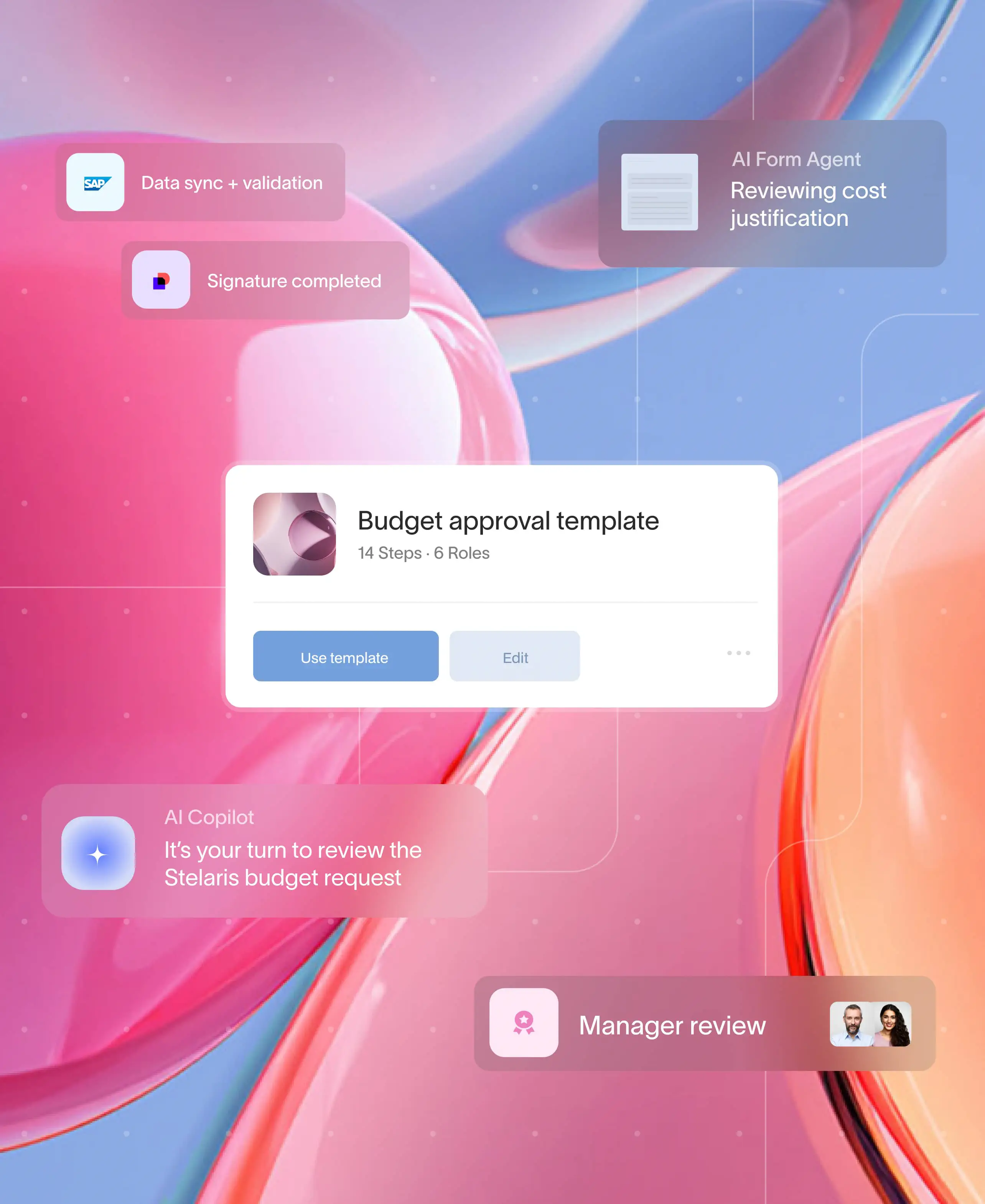
AI is a true game-changer for workflow management in 2025, revolutionizing how businesses operate. It empowers businesses to make strategic decisions and deliver exceptional customer value, setting the course for long-term success.
As technology evolves, AI workflow management is no longer a futuristic fantasy, but a present-day reality. From large to small businesses, AI is reshaping business paths to drive success and sustainable growth.
AI-driven workflow management systems are capable of automating complex tasks, streamlining processes, and enhancing decision-making. They help businesses improve their overall efficiency to improve customer success and retention.
But how exactly is AI revolutionizing workflow management in 2025? Here are some valuable insights.
AI’s role in revolutionizing workflow management
1. Automated routine and repetitive tasks
The most significant impact of AI on workflow management is the automation of routine and repetitive tasks. It minimizes human intervention by automatically handling time-consuming tasks. With automated document collection and analysis, AI ensures a seamless response to customer inquiries without human input.
For example, AI processes multiple customer requests simultaneously, in real-time. It also offers personalized responses, enhancing customer experience.
Automation of routine tasks ensures faster response time, minimal errors, and improved efficiency in workflow management.
2. Improved decision-making and predictive analytics
AI seamlessly integrates predictive analytics into workflow management systems and revolutionizes decision-making processes. Businesses can easily analyze real-time data to make better and smarter decisions, driving success.
For example, AI understands customer behavior to suggest improvements to the onboarding process that boost productivity. Additionally, businesses can implement proactive strategies for potential risk to maximize their performance.
These powerful insights help businesses stay ahead of the competition. Moreover, it helps businesses make well-informed decisions that drive growth and success.
3. Intelligent task management
AI is not only about workflow automation but also about enhancing task management. With AI integration, businesses optimize task assignment, tracking, and completion. It further ensures that only authorized people handle the tasks for better results.
For example, AI evaluates deadlines, complexities, and dependencies of various tasks to schedule their optimal execution. Moreover, AI automatically routes customers' inquiries to experts for optimal support and value.
Intelligent task management ensures the timely completion of tasks with reduced bottlenecks. As a result, businesses can maintain a steady workflow and reduce their turnaround time.
4. Enhancing team collaboration
AI is expected to transform team collaboration in 2025, making it easier to work together, irrespective of location. As it promotes seamless communication and collaboration, it also automates document sharing. It may also suggest relevant resources by understanding the context of the discussion.
For example, AI can evaluate the progress of ongoing projects and automatically share updates with authorized individuals. Moreover, it ensures to keep everyone in the loop by streamlining communication and sharing.
AI eliminates many barriers of remote work by automating processes for teams to work together efficiently.
5. Real-time monitoring and performance tracking
AI is revolutionizing the monitoring and tracking of workflow progress for businesses. It empowers businesses to track key performance indicators (KPIs) in real time to gain valuable insights into projects and operations. They can monitor workflows and flag potential issues, bottlenecks, or inefficiencies for improvements.
For instance, AI can track customer productivity by analyzing their behavior. It also helps businesses identify inefficient workflows that hinder overall productivity and growth.
With these real-time insights, AI enables businesses to optimize their performance with continuous improvements in their workflows.
6. Better communication
Another significant way AI is transforming workflow management in 2025 is by enabling better communication. AI workflow automation software makes communication between clients and businesses more efficient. AI-powered chatbots, virtual assistants, and email automation tools ensure instant conversational response, reducing manual input and improving communication speed.
For example, AI-powered chatbots can handle complex customer inquiries to provide tailored responses promptly. Moreover, it can draft responses based on previous conversations.
This not only reduces the time spent on communication, but also increases efficiency and productivity across workflows.
7. Enhancing customer experience and personalization
AI is also transforming the customer experience in workflow management. In 2025, AI enables businesses to personalize customer interactions, providing tailored recommendations and resolving issues more efficiently. The AI-powered CRM can analyze customer data, preferences, and past interactions to offer personalized experiences across touchpoints.
For example, AI can analyze customer behavior for personalized recommendations based on their browsing preferences. AI-driven chatbots can engage customers, providing real-time solutions to their problems.
This level of personalization enhances the customer experience, leading to higher satisfaction, loyalty, and retention rates.
8. Workflow optimization
Workflow optimization using AI-driven solutions enables businesses to reduce their operational costs. By automating repetitive tasks and identifying bottlenecks, businesses streamline workflows and optimize operations. AI plays an essential role in identifying various cost-saving opportunities across the entire workflow.
For example, AI reduces administrative overheads by integrating with payment processing software. This improves customer retention and reduces churn rates.
These cost-saving opportunities improve overall efficiency and profitability, making businesses more competitive in the marketplace.
Conclusion
AI is revolutionizing workflow management in 2025 by driving overall efficiency for businesses. From real-time monitoring to personalized customer interactions, the benefits of AI workflow automation are clear.
As businesses evolve and scale, AI is likely to shape workflows, improve productivity, and drive growth. With the right structured approach, AI can transform workflow management, leading to improved operational performance and lasting success.
Workflow management with Moxo
In 2025, Moxo is leveraging AI-driven technology to revolutionize workflow management for businesses to scale and operate better. By integrating advanced AI capabilities, Moxo empowers businesses to automate complex processes, improve decision-making, and drive greater efficiency.
Moxo streamlines routine tasks with automation to reduce human errors and save valuable time. Additionally, with AI-powered predictive analytics, Moxo identifies bottlenecks and inefficiencies to make optimal workflow adjustments. With AI workflow management, businesses remain agile and responsive in an ever-changing competitive landscape.
AI integration also enhances collaboration by ensuring authorized access to sensitive information. This ensures that the right people have the right and updated information at the right time. This reduces delays, improves productivity, boosts performance, and delivers personalized customer experiences.
Besides AI workflow automation, the real-time insights powered by AI analytics enable businesses to monitor and optimize workflows. This empowers them to make data-driven decisions, and improve their operational efficiency and customer satisfaction. By embracing AI, Moxo not only automates workflows but also empowers businesses to innovate and grow faster.
Key features of Moxo to rely on
- Automating routine tasks
- Intelligent task management
- Streamlined communication
- Predictive analytics for smarter decisions
- Seamless collaboration and integration
- Improved customer onboarding
- Enhanced client experience
So, are you ready to leverage AI to transform your workflow management? Drive efficiency, streamline operations, and fuel long-term success for your business. Schedule your demo call today and get started with Moxo.
Moxo's integration of AI in workflow management in 2025 isn't just limited to being a technological advancement; it is a paradigm shift to help businesses run smarter, faster, and more efficiently.
Moxo is helping businesses to scale their operations while maintaining high standards of quality and service. The future of workflow management is here – and it is powered by AI.
FAQs
How does AI automate repetitive tasks in workflow management?
AI categorizes information based on patterns. With automation, it speeds up processes and reduces errors to focus on higher-value activities. Owing to this, businesses can work on creativity, critical thinking, and problem-solving, driving growth and success.
How does AI enhance decision-making in workflow management?
AI integrates predictive analytics, helping businesses make data-driven decisions. It identifies trends after analyzing customer behavioral data and information to make predictions for future outcomes. As a result, businesses can easily address potential issues and optimize workflows.
How does AI improve collaboration in workflow management?
AI enables businesses to enhance collaboration with seamless integration of smart communication and project management solutions. With an organized and automated approach to communication, AI maintains smooth data flow. This helps businesses improve coordination, make faster decisions, and achieve higher productivity.






